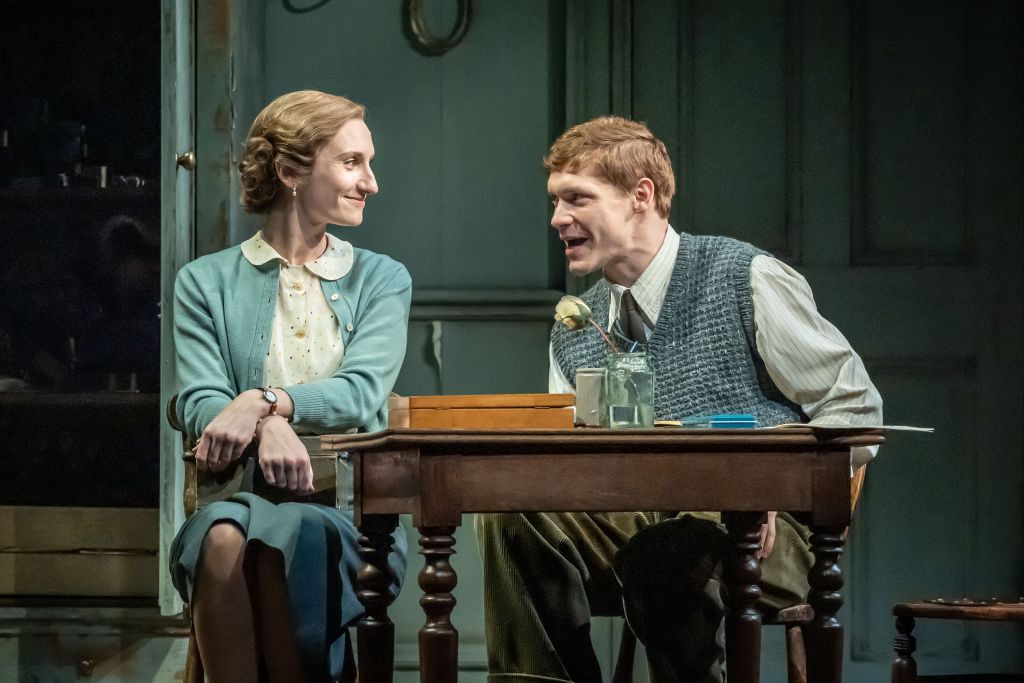Sisters are doing it for themselves, just as families as a whole are, too, on the London stage these days. Dear Octopus follows Till the Stars Come Down and The Hills of California as the third domestic drama I've seen in the last 10 days and in some ways the most surprising. Rarely encountered since its 1938 premiere which starred a young John Gielgud, Dodie Smith's leisurely play emerges as a real pleasure, not least for returning the wonderful Lindsay Duncan to a preferred address for a performer whom I first saw on this same stage - the National Theatre's Lyttelton - in Cat on a Hot Tin Roof in 1988.
Her theatrical command is undimmed by time, which itself dovetails well with a play that meditates often on people's ages and growing older, affixing colours to decades and granting 77 (as in numbers of years old) the status of a punchline. That last salvo is delivered by Duncan's Dora, as she ascends the staircase of a faded family manse, whose various locations slide effortlessly in and out of view as Frankie Bradshaw's beautifully muted set turns on its revolve. Oliver Fenwick's lighting, too, evokes a time when electricity in the home was a rare thing and, in this instance, not a luxury that Dora is especially keen on acquiring.
She and husband Charles (a brisk Malcolm Sinclair) are celebrating their golden wedding anniversary, which means bringing together multiple generations of family members both close but also mostly absent: one daughter, Cynthia (Bethan Cullinane), has been rather mysteriously living in Paris for seven years. The precise connections are laid out with the precision one associates with Jane Austen, and the presence of Chekhov is felt in the physical uses of both a nursery and a dining table full to bursting not to mention a crazy quilt of affections, unreciprocated or otherwise. Time is central to Three SIsters, as it is here.
 Dora quotes Ecclesiastes, calls everyone "dear" and presides with a motherly aplomb that can turn astringent on cue (a few of her quips put me in mind of Joan Rivers). Duncan's genius is to couple the character's innate quickness of thought with a watchfulness that extends across the various strands of a fraying household - the "dear octopus" of the title "from whose tentacles we never quite escape". That grip includes the hold exerted by the dead over the living within a brood that has known its share of loss.
Dora quotes Ecclesiastes, calls everyone "dear" and presides with a motherly aplomb that can turn astringent on cue (a few of her quips put me in mind of Joan Rivers). Duncan's genius is to couple the character's innate quickness of thought with a watchfulness that extends across the various strands of a fraying household - the "dear octopus" of the title "from whose tentacles we never quite escape". That grip includes the hold exerted by the dead over the living within a brood that has known its share of loss.
The image gives the play its title and is spoken by Nicholas, the handsome bachelor son - "nearly 35" - who feels a "spiritual lack" and very possibly a physical one, as well. Billy Howle is terrific inheriting Gielgud's onetime role, questioning what it might mean to be "not married, or anything," even as he sparks the affections of the younger and "unsophisticated" Fenny (Bessie Carter, superb, pictured above with Howle), Dora's confidante. Once again, one senses a Chekhovian interplay between two characters who spend much of the show's three hours circling one another, even as we are introduced to the OCD sister Hilda (Jo Herbert) and the lively if put-upon Margery (Amy Morgan), whose weight is a frequent topic of conversation. (Speaking of conversation, did people in the 1930s really talk of "owning it", in interpersonal terms, as Kate Fahy's Belle, the aunt returned from 25 years in America, does here?)
Smith, the author, has been faulted for a shortfall in action, which in context is absurd. The author of 101 Dalmatians and I Captured the Castle casts an unerring eye on random quotidian details - folding napkins to resemble waterlilies - while the characters ruminate about the largely wonderful mystery of life and their position in it. "One life isn't long enough," decides Dora, whose fundamental happiness gets noticed by her son. Nicholas, meanwhile, ponders "love, life, what have you" like a kind of trainee existentialist which sits nicely with an actor who has already played Hamlet.
The National has done well to visit a neglected corridor of the 20th-century repertoire in a production that stands alongside their feted take on Terence Rattigan's After the Dance in reaching toward the back catalogue in genuinely rewarding ways. To be honest, I could have done with somewhat less of the cute, precocious kids that crop up a lot in plays from that period: take Lillian Hellman's Watch on the Rhine, revived in London last year, has much the same quotient of young 'uns.
So capacious a spread of characters - at the play's start, Dora is preparing for 30 celebrants - means that we sometimes lose focus on one person as we adjust our sights on another. And yet it's been some while since I so fully and happily surrendered to a bygone world laced with warmth, wit, and a clear-eyed worldliness that keeps sentimentality at bay. As the assemblage convene towards the end for their place at the table, you may find yourself wanting to pull up a chair, as well.















Add comment